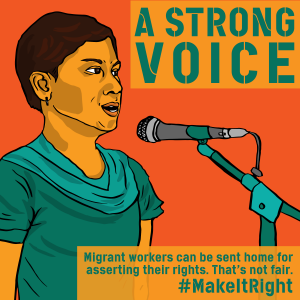There’s lots of talk about “good jobs” these days. At the same time, the expectations for what makes work not only “good” but even a “job” keep falling. It’s hard to fight for better (and less) work in light of decades of defeat for workers as an organized force, years of lingering post-crisis fallout and constant reminders that neighbours, robots, migrants…everyone is coming for whatever job you may have left (I have an article about this last bit in the upcoming issue of Briarpatch).
In a world of part-timers, permatemps, temporary migrants, contractors, sub-contractors, Uber “partners”, Taskrabbits and many others unemployed, the good job means something different than it did several decades ago. The white and male world of the “Golden Age” job is not yet gone but continues to be aggressively dismantled. We should be wary of misplaced nostalgia for the past or magic policy bullets that elide transformations.
Despite this, struggles over how work is organized remain central to how social life is organized. So even as the engine of job crapification makes its way through the world of work, we should be ready to demand more when the conditions are ripe. Progress in making jobs worse has been accompanied by continued technological change that could be making work shorter, easier, better-rewarded at the very least – at best, building conditions to transform social relations.
These scribblings are occasioned by a request to submit a micro (100 to 200-word) proposal for a local conference on the topic of creating good jobs in British Columbia. In truth we need thousands of words to assess our weaknesses, our strengths, our tactics and our strategies; in short, how to organize. I cannot pretend to know concrete demands that energies can coalesce around, whether locally or broadly. Demands are born out of organization.
Some, however, are already well-articulated. So, in light of these thoughts, here is a submission that is really just the paraphrased position of migrant farm workers and their organizations. It is concrete, rooted in ongoing organizing and yet tied to a global division of labour and ownership.
♠ ♣ ♥ ♦
Good jobs start on the farm
Any ideal of good jobs needs to include migrant farm workers whose jobs are some of the furthest from possible ideals. Migrant farm workers are effectively indentured labourers. They are tied to a single employer, denied basic rights, often victims of wage theft, ineligible for permanent immigration and always subject to the threat of employer-initiated deportation.

Migrants and their organizations have been clear about their demands: in short, integrated labour and immigration reform that would dismantle the de facto indentured status of migrant workers. Provincially, the British Columbia government should be pressured to:
- give an authority the power to proactively inspect and sanction employers (similar to that in Manitoba),
- eliminate piece rates in agriculture thereby reducing the incidence of below-minimum wages,
- allow migrant farm workers to unionize and institute card check to reduce employer harassment,
- fund migrant-run worker centres,
- and ban recruitment fees.
At the same time, pressure needs to be brought on the federal government to give all migrant workers open permits that do not tie them to single employers as well as immigration status on landing for them and their families. Such immigration reform guarantees that any labour protections will be meaningful and enforceable. The lack of anything even resembling a decent – nevermind good – job for migrant agricultural workers puts into question the commitment to good jobs for all.
One reply on “On the hunt for good jobs”
Excellent take on the current situation of employment in this country. The plight of migrant agricultural workers is nothing more than a foundation of the crappification of employment in this country. We recruit these individuals, often at great social and financial cost to them, only to treat them like second class citizens in an effort the keep the bottom line as low as possible. Meanwhile, we have a large portion of the population in our country that wouldn’t even tough the same jobs, mainly due to the poor conditions that accompany them. It’s almost ironic if it wasn’t for the fact of how sad it really is.
Not to mention, that the work force is still rapidly changing. One has to question who really is the driving force behind much of the change? If you look at how new jobs are being created and old ones restructured, we see an increase in female employment and also a renewed focus on educated visible minorities. However, we are also witnessing a large diluting to the wages and security of many of these very same jobs. No longer can someone really find a career that offers long term security, hence the emphasis on the temp worker.
It is as if the very people we fought to bring greater equality and fairness, turned a corner, threw a blanket over our eyes and pretended to give us what we wanted, all the while transforming the game to favour their pocket books, while the rest of us stand here scratching our heads wondering where it all went wrong in the first place.